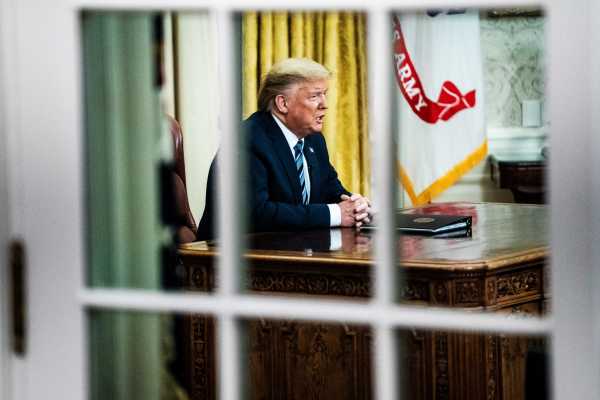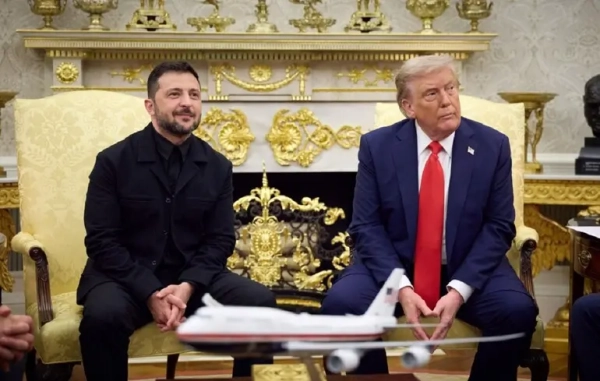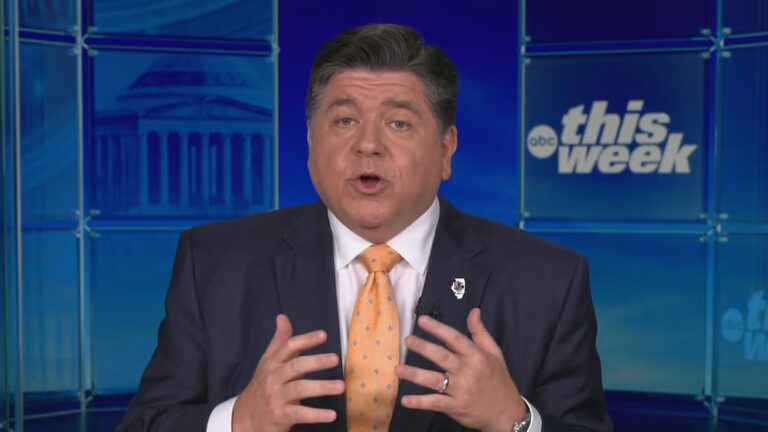
Ashish Jha doesn’t consider himself very political or an alarmist. But when it comes to the coronavirus and President Donald Trump’s response to it, the director of the Harvard Global Health Institute is very clear: The Trump administration has really screwed up.
“I think by any objective standard their response so far has been dismal,” Jha told me on Thursday, the day after Trump’s speech from the Oval Office. “They have completely failed on getting testing capacity ready and available across the country, even though they’ve had a month and a half to do it.
“And then the messaging coming out of the administration has been deeply disturbing. Downplaying the epidemic, calling worries about it a ‘hoax,’ politicizing it — all things that I think have left the country far less prepared than it needs to be for what is a very substantial challenge ahead.”
I spoke to Jha about what the administration should be doing and encouraging. He pointed to three key things: First, testing needs to actually be made widely available — not just so sick people can be caught and isolated, but also so people they’ve been in contact with can be warned and quarantined as well.
Second, especially while we don’t have enough testing, Americans need to do a lot more social distancing, whether that’s avoiding large gatherings, working from home, or moving university classes online.
Finally, the health care system should build up capacity to prepare for the influx of patients with Covid-19, which is the disease caused by the novel coronavirus.
But Jha argued that the administration has not been doing a good job on these issues. “It’s been surprising to me that the administration’s had a hard time executing on some of these things,” he said.
Here’s my full interview with Jha, which has been edited for length and clarity.
German Lopez
What do you make of the Trump administration’s response to Covid-19 so far?
Ashish Jha
There are a couple of things that give me some hope. They’ve obviously enlisted both Tony Fauci and Debbie Birx, who are extraordinary. Both of them are among the best people in the country. And I think that gives me some hope — that they’ve got good folks in the inner circle.
But I think by any objective standard their response so far has been dismal. They have completely failed on getting testing capacity ready and available across the country, even though they’ve had a month and a half to do it.
And then the messaging coming out of the administration has been deeply disturbing. Downplaying the epidemic, calling worries about it a “hoax,” politicizing it — all things that I think have left the country far less prepared than it needs to be for what is a very substantial challenge ahead.
German Lopez
A lot of what I’ve heard experts say that should be getting done, like encouraging hand-washing, more testing, encouraging social distancing, seem pretty straightforward. They’re things the country has done before. Yet you’ve got the administration struggling at just getting even testing done.
Ashish Jha
Look, the testing debacle is complicated, and it’s complicated in the sense that there have been a series of missteps that have led to the testing problems that we have right now: The decision not to use the WHO kit that most of the other countries have. The decision to go our own way, which is not necessarily unreasonable; CDC has a long track record of developing tests are quite, quite good.
But then just having failure after failure in our own approach and what I have really seen as a lack of urgency and lack of priority in making widespread testing available.
That has been just really stunning to me. It leaves us less prepared and worse off on this pandemic than a vast majority of other countries. We are a country, I’ve often said with the best public health agency in the world, and we have great resources, ingenuity, technology. This is not where we should be struggling. And yet kind of political ineptitude has landed us here.
German Lopez
It seems like you think that, that seems to me like that began years ago, when they shut down the White House agency that should have been handling a lot of this. Do you think that helps explain some of the failures we’re seeing now?
Ashish Jha
There are a couple of things. One is leadership is a lot about signaling. When you get rid of the office within the National Security Council that focuses on these kinds of threats, and you get rid of the experts who really understand it very, very well, you’re doing two things: You’re losing that expertise, of course, and therefore you’re not prepared. You’re also signaling to the government and all the agencies this is not a priority. And that means that even other agencies end up not putting as much attention and energy on it. So this has been a longstanding problem of the White House.
By early to mid-January, it became clear that this was going to end up being a really big problem. And certainly by the end of January, it was very clear that this was gonna end up being a global problem. Their response was to go to their kind of go-to playbook, which is shut down flights and try to kind of do border control and shut down flights to China and do border control.
I don’t think that shutting down flights to China was necessarily the wrong thing, but it was completely inadequate. That’s part of the broader problem with the administration: they essentially have a couple of tools that they use for almost every problem. And sometimes some problems require a much broader set of tools.
Here we are in mid-March, and we still can’t test people for coronavirus in America.
German Lopez
Did Trump’s speech on Wednesday do anything to allay your concerns?
Ashish Jha
The response of the stock market today [when it tanked on Thursday] gives you a pretty good feel for how most people have reacted to this. There was nothing in that speech that made you feel like the Trump administration really understands either the severity of the problem or what it’s going to take to get us out of it.
German Lopez
It included, as far as I can tell, nothing to actually stop the spread of the disease within the US. Literally nothing.
Ashish Jha
Yeah. That’s why I said it was a distraction. I think it made things significantly worse off. I don’t know any public health officials who felt even an iota of assurance coming out of that conversation.
German Lopez
What are some of the major policy levers here that the federal government should be using?
Ashish Jha
There are three things that I think are really critical. One is we’ve got to get testing out and available broadly. Like now — yesterday would have been better than today, today’s better than tomorrow. I know every week we hear from Vice President Mike Pence that it’s a million tests are going to be available by the end of the next week.
I spoke to a couple of senior health officers, officials of states [on Wednesday], and they’re still saying things like, “Yeah, we’re going to be able to do 50 or 80 tests a day by the end of the week.” So these million tests that are supposedly out there, they are not coming down to states yet. States still don’t feel like they’re able, and at least some things I’m hearing suggest states think it’s going to be many weeks before we’re able to do widespread testing. If it is indeed many weeks, that’s a disaster. Because, as you know, the community spread is happening across America. And the number of cases is doubling every six days.
We just don’t have many weeks to not be able to test people. So that I think is probably priority one, two, and three.
But since we can’t test, I think we need to do very aggressive social distancing. I think it is no longer a time where people should ask questions like, “Can you hold a big conference? Should we have this major meeting?” No. There should be none of that happening.
I was on a call with some CDC people a couple of days ago. They were saying, well, here’s our guide for how to host a large meeting at this moment, what you should do to try to keep people safe. And there’s only one thing to do if you want to keep people safe, which is not to host the meeting at all. And CDC, it would be really helpful if the CDC just came out and said that, if the federal government provided strong guidance. They’re not doing it, or states are kind of doing it on their own.
It’s probably a time where employers should be asking who really needs to come into the office, if anyone, and try their very, very best to make everybody work remotely.
I can’t imagine that there can be any universities that are going to be doing in-person classes a week or two weeks from now. I think all universities are gonna have to move online.
I think we’re in a tough period on social distancing, but we have to do it for the next while, until we sort out both how bad the infections are or what the kind of rates of infections are across the country.
Then the last thing we need to do is we need to prepare our hospitals and the health care system more broadly. Some hospitals have gotten religion on this and understand that there’s a potentially big wave coming. I think other hospitals haven’t.
We’ve been doing some analyses looking at just how much capacity do we have and what would it take to overwhelm us nationally and individual communities, and the numbers are bad. Even if infection rates go to 2, 4, or 5 percent of the population — and estimates are actually that 20 or 30 percent of the population may end up eventually getting infected — hospital beds are going to get completely filled up, ICU beds are going to get completely filled up, and we’re going to have a hard time managing.
That’s not two months away; I suspect it’s a couple of weeks away. We’ve got to get going now on figuring out: How do we open up more capacity? How do we cancel elective surgeries? How do we make sure that doctors and nurses are safe?
Look, imagine that I’m wrong on all of this and imagine that we got lucky and it doesn’t spread and people do fine. Great. We overreacted a little bit and it made us a little less productive and it wasn’t terrific. If I’m right and every other public health expert is right and we didn’t prepare, it’s calamitous. This is really a no-brainer call. We’ve got to assume that there is a large influx of patients coming— and we’ve got to start working on that now.
German Lopez
What are some of the bad or unhelpful ideas you’ve seen out there?
Ashish Jha
Continuing to talk about this as in the comparison to the flu is really unhelpful. It just diminishes the seriousness of this.
Of course, there’s a ton of misinformation about drinking bleach and blah, blah, blah — that stuff is very harmful, because a certain chunk of the population starts believing it.
As long as misinformation stays in the fringe, we’ll have to live with it. I worry that it becomes a bit more mainstream and then people stop listening to public health officials altogether. So I think that’s a real threat.
We can get through this and we can get through this without wreaking havoc on our health care system or on our population. But it’s going to be hard work.
German Lopez
What do you think of Joe Biden’s plan?
Ashish Jha
I like it. I’m not political. I haven’t endorsed any campaigns, and I’m not working with any campaigns. But I read through his plan, and it’s good. It captures a lot of the stuff we’ve been talking about.
Testing and reducing cost barriers to testing is really critical because obviously testing is no good if people aren’t going to come forward because they’re worried about accessing it.
The features in the plan around allowing people to work remotely: It’s easy enough for me to say, “Hey, I should work remotely.” I’m a reasonably well-paid Harvard professor. But what about hourly wage workers for whom this is going to be very, very painful and difficult Offering relief to people like that is going to be extremely important.
I saw this as a comprehensive plan. Not a ton of details; it’s a pretty high level. But more testing, more access, more investments in vaccines, and a lot more effort around softening the blow of what we need to do, especially for low- and middle-income people — that’s the right strategy.
German Lopez
On softening the blow for these workers, people might see this in purely economic terms, but this is important for fighting the pandemic itself, right?
Ashish Jha
Exactly. If you ask people who are very marginal and barely had enough money to put food on the table, if you ask them to not work and therefore not get paid, and choose between that and having to go to work and put themselves or others at risk, that’s a terrible choice. And a lot of people are going to make “the wrong choice,” and you’d understand why. This is not about just helping people economically; this is about fighting the virus.
German Lopez
A lot of this seems like stuff that wouldn’t normally be very partisan, normally wouldn’t be particularly difficult or complicated. Not to take away credit from anything policymakers are doing on this, but it seems a lot of this is common sense. And it’s still being botched by the administration.
Ashish Jha
It’s been surprising to me that the administration’s had a hard time executing on some of these things. But I agree.
My sense now talking to people who are talking to the administration is that they recognize where things are, and I don’t know what’s getting them to finally realize it. It may be the large drops in the stock market. It may be members of Congress. Or whatever it is.
I always say most of these public health interventions, they’re not rocket science. They really aren’t. They’re very straightforward things.
And I think the administration is finally starting to understand that they have to work on this. At least, I hope so.
Sourse: vox.com






